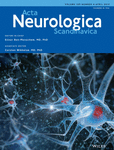Hemofiltration for neuroprotection in acute ischemic stroke: A prospective, pilot study
Funding information
This project was supported by the Ministry of Education and Science of Kazakhstan.
Abstract
Background
Hemofiltration reduces blood levels of cytokines, glutamate, and other substances that increase the risk of stroke-associated neurodegeneration. This study aimed to assess the safety and efficacy of hemofiltration in acute ischemic stroke patients.
Methods
A total of 37 patients (mean age 56 ± 16 years) who had an ischemic stroke within the previous 12 hours were randomized to receive hemofiltration for 36 hours (n = 19) or standard treatment (n = 18). The primary outcome of interest was the occurrence of adverse events during the 28-day period following the stroke symptom onset. The secondary outcome was to assess the efficacy of hemofiltration in acute ischemic stroke.
Results
Eighteen patients who received hemofiltration and 17 patients who received standard care completed the study. There were no cases of sepsis or infection at the hemofiltration cannula site, nor other hemofiltration-related complications. There was one case of fatal hemorrhagic transformation in each of the two groups. We failed to find any favorable effects on NIHSS scores at 7 days. However, we observed 17 patients (94%) with systemic inflammatory response syndrome in the control group and only 13 (68%) in the hemofiltration group.
Conclusion
Hemofiltration appears to be safe in acute ischemic stroke patients, but we were unable to demonstrate its efficacy. However, for a definite conclusion on efficacy, a larger study with longer follow-up is required.
CONFLICT OF INTEREST
We declare no competing interests.




